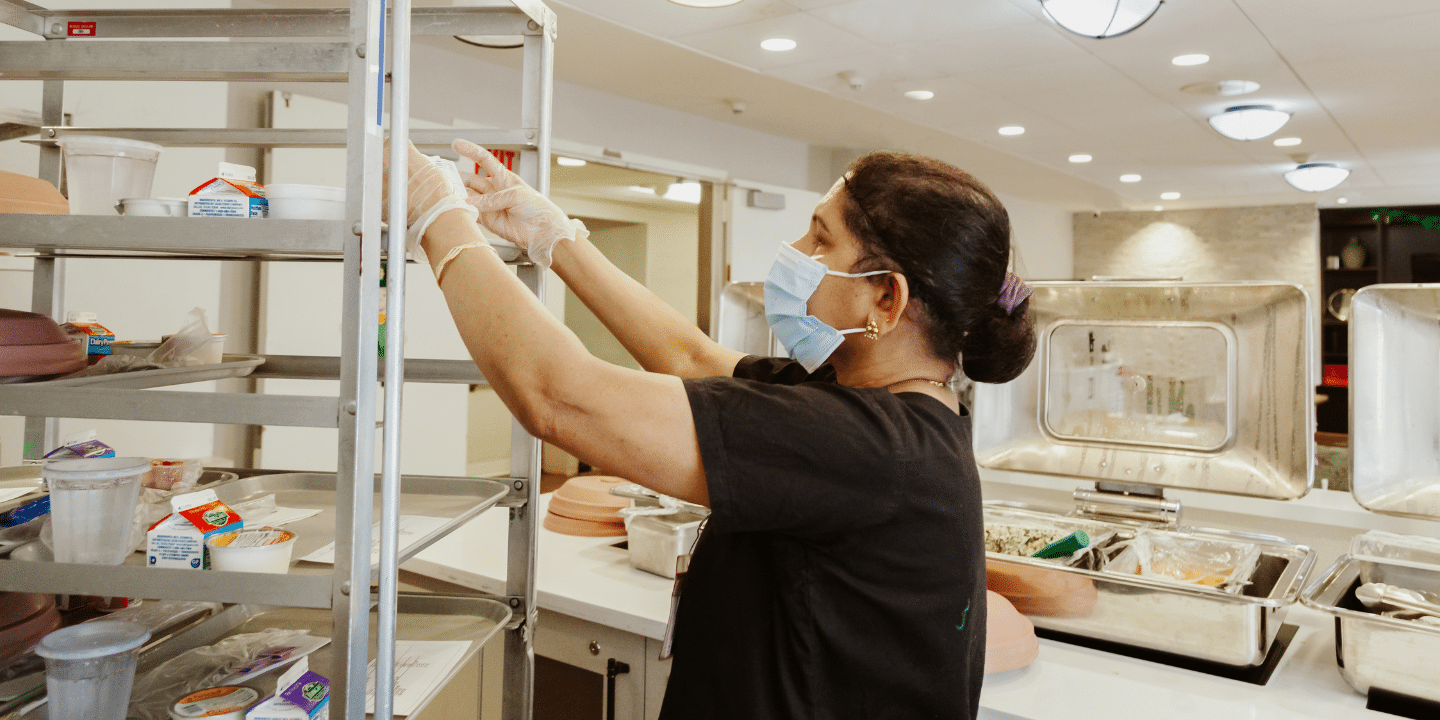Written by Armani‑Marie Mendez, Registered Dietician (RD), Manager, Nutrition Care 1
Proper nutrition plays a crucial role in the recovery process of short-term rehab patients at The Methodist Home for Nursing and Rehabilitation. We take great pride in our commitment to providing quality five-star care, including our comprehensive approach to nutrition.
Understanding the importance of a well-balanced diet during recovery helps us to ensure our patients receive the nutrients they need to regain their strength and support their healing process.
Nutrition During Short Term Rehab
At the Methodist Home, we recognize that food is the best source of complete nutrients for our patients. Registered Dietician Armani-Marie Mendez explains, “We promote food first as the best source of complete nutrients and to keep our patients’ chewing and swallowing functions engaged. We have heard wonderful feedback on our menu and for residents who unfortunately have suboptimal eating, we do monitor and offer a variety of supplements and nourishments.”
We also offer an “always available” menu featuring sandwiches, fresh fruit, and cookies, which ensures patients have access to a range of options. Meals and snacks served at the Methodist Home emphasize factors such as offering variety in menu options, accommodating dietary restrictions, and meeting individual preferences.
Special Diets Available at the Methodist Home
Tube Feeding
Tube feeding is an alternative means of nutrition, commonly in place for patients whose means of consuming an oral diet are significantly impaired, it is required to meet nutritional needs through formula and feeding tube. The permanence of tube feeding depends, as it can be a long term or short term solution to keeping a patient nourished. At the Methodist Home, we have successfully weaned two patients off of tube feeding in the last month with ongoing monitoring and coordination of care with our speech therapy and medical teams.
Cardiac (Heart Healthy) Diet
This diet aims to promote cardiovascular health. It focuses on foods low in fats saturated and trans, cholesterol, and sodium.
Diabetic (Carbohydrate Count) Diet
Our diabetic menu is carbohydrate counted and focuses on managing blood sugar levels while promoting diet flexibility for our long term and rehabilitation patients due to their longer length of stay. Where 15 grams equal one carbohydrate count, the diet is calculated to balance carbohydrates, proteins, and fats while eliminating foods with added sugar to substitute with healthier alternatives and promote blood glucose regulation. Further diet restrictions are offered to patients upon medical referral or by request.
Gluten-Free Diet
This diet eliminates gluten, a protein found in wheat, barley, and rye, making it suitable for individuals with gluten intolerance or celiac disease. It includes alternatives like rice, corn, quinoa, and gluten-free products. This diet is available upon request on an as-needed basis.
Kosher Diet
A kosher diet adheres to Jewish dietary laws and follows specific guidelines for food preparation and consumption. We offer Kosher Style for diet flexibility and have accommodations for patients who observe traditional Kosher restrictions. This diet is available upon request.
Renal (Kidney) Diet
This diet is designed for individuals with kidney disease and aims to reduce the intake of certain nutrients like sodium, potassium, and phosphorus while ensuring adequate protein intake. Kidney patients can also receive their treatments on-site in our Rogosin Institute Hemodialysis Center.
Fluid Restriction Diet
This diet involves controlling fluid intake for individuals with conditions such as congestive heart failure or kidney disease to manage fluid retention and prevent complications. Patients receive visits to obtain preferences while on restriction with education provided along the way.
Other Special Needs
In addition to the main diets currently offered, we also offer diets for No Added Salt, Regular, Low Potassium, and mechanically altered options including Ground, Pureed, and Mechanical Soft diets for patients who may be experiencing difficulty chewing and/or swallowing.
Our emphasis on nutrition as an integral part of the recovery process helps promote optimal healing and overall well-being of our short term rehab patients by providing well-balanced meals, accommodating dietary restrictions, and meeting individual preferences.
Discharge Education at the Methodist Home
When a patient is nearing the end of their short term rehab stay and is preparing to return to their home or community, we provide educational resources, counseling, or personalized guidance on nutrition and dietary management to help them maintain their health post-discharge.
Patients with fluid restrictions or specialized diets are most commonly counseled, not limited to but including patients on Renal, Cardiac, and Diabetic diets.
Can We Answer Any Questions for You?
If you have any questions about nutrition and its role in short term rehab recovery at the Methodist Home, you can contact our admissions department anytime, or schedule an on-site tour to meet our staff and see our recently renovated historic home.

